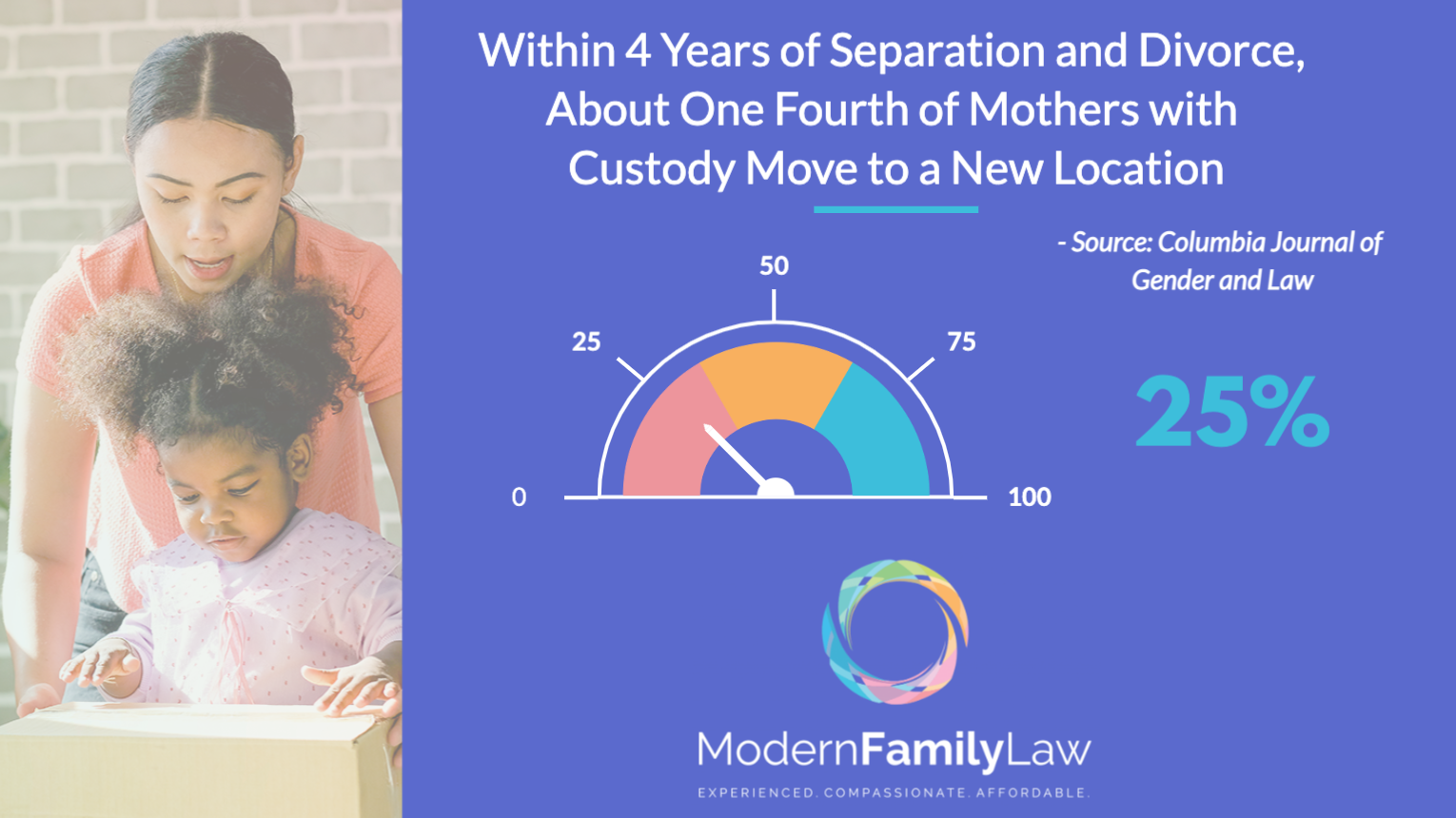MOVE-AWAY CASE ATTORNEYS
IN CALIFORNIA
Modern Family Law's move-away case lawyers in California specialize in assisting parents with all matters of relocation. Our lawyers can help California parents navigate the legal process involved in obtaining permission to relocate "move-away", as well as represent them in court if necessary. Our attorneys have extensive experience in move-away cases and are well-versed in the state laws and regulations.
We understand how overwhelming it can be to navigate the complex legal process involved in relocating with a child. Moving with a child can be a difficult and emotional process and we are here to guide you through every step of the way. We will work with you to understand your situation and develop a strategy that is tailored to your specific needs. Learn about move-away cases in California including:

Our experienced California child custody attorneys understand that no case is the same. We encourage you to reach out and share the details of your case with them so they can provide you with the guidance you need. Whether you are seeking to move with your child to a new location or you are trying to prevent the other parent from relocating with your child, our attorneys have the experience to help. With our assistance, you can rest assured that your child relocation case will be handled professionally and efficiently.
WHAT IS A
MOVE-AWAY CASE IN CALIFORNIA?
In California, move-away cases are complex legal disputes that require parents to seek the assistance of a family law attorney with expertise in child custody cases. When a parent with joint or sole custody of their child decides to relocate to a new location that would disrupt the current custodial arrangement, the other parent may oppose the move, leading to a dispute over custody and visitation rights.
The parent who wishes to move must provide a valid reason for the relocation, such as a new job opportunity, a need to be closer to family or medical care, or other compelling circumstances. The other parent may argue that the move is not in the child's best interests, citing factors such as the distance between the child and the non-relocating parent, the impact of the move on the child's education, social life, or relationship with the non-relocating parent, and other relevant considerations.
In a move-away case, the court is tasked with deciding whether to grant or deny the parent's request to relocate with the child. The court's primary focus is always the best interests of the child, and it may consider various factors, including the child's age, the child's relationship with both parents, the reasons for the move, the proposed visitation plan, and other factors relevant to the child's welfare.

Ultimately, the court will make a decision based on the specific circumstances of the case. The outcome of the case may be a modification of the existing custody order to reflect the new arrangement or a denial of the move-away request. It is important for parents involved in move-away cases to have the guidance and representation of an experienced attorney to navigate the legal process and protect their rights and interests, as well as their child's well-being.
WHAT IS THE LEGAL FRAMEWORK
FOR MOVE-AWAY CASES IN CALIFORNIA
Move-away cases in California are governed by specific legal provisions contained in the California Family Code, specifically Section 7501. This section sets forth the requirements and procedures for obtaining court permission to relocate with a child.
“A parent entitled to the custody of a child has a right to change the residence of the child, subject to the power of the court to restrain a removal that would prejudice the rights or welfare of the child.”
Under California law, a parent with joint or sole custody of a child must obtain court permission before moving away with the child if the move would substantially interfere with the other parent's custodial rights. The parent seeking to relocate with the child must file a request with the court, giving notice to the other parent and providing a valid reason for the proposed move.
The other parent has the right to object to the move and to present evidence to support their opposition. The court will then evaluate the evidence and make a decision based on the best interests of the child.
When making a move-away decision, the court considers a variety of factors, including but not limited to the following:
1. The child’s age, gender, and maturity level;
2. The child’s relationship with each parent;
3. The distance of the move and its impact on the child’s relationship with the non-relocating parent;
4. The child’s ties to the community and school;
5. The reasons for the proposed move;
6. The quality of life that the child will have after the move;
7. The proposed visitation plan;
8. Any history of domestic violence, substance abuse, or other issues that may impact the child’s well-being.
Based on these factors and other relevant considerations, the court will determine whether to grant or deny the move-away request. It is important for parents involved in move-away cases to have a clear understanding of the legal framework and requirements for obtaining court permission to relocate with their child. A knowledgeable and experienced family law attorney can help guide parents through the legal process and protect their rights and interests.
HOW ARE MOVE-AWAY CASES
DECIDED IN CALIFORNIA?
The court process for move-away cases in California typically involves several stages. The first step is for the parent seeking to relocate with their child to file a request with the court, giving notice to the other parent and providing a valid reason for the proposed move. The other parent then has the opportunity to object to the move and to present evidence in support of their opposition.
If the parties are unable to reach an agreement, the court may order mediation to assist in resolving the dispute. Mediation can be an effective way to help the parties reach a mutually acceptable agreement without the need for a lengthy court battle. During mediation, a neutral third party helps the parties work through their differences and develop a plan that is in the best interests of the child.
If mediation is unsuccessful, the case may proceed to a court hearing. At the hearing, the court will evaluate the evidence presented by both sides and make a decision based on the best interests of the child. The court's decision may include modifying the existing custody and visitation orders to accommodate the proposed move or denying the move-away request altogether.
In move-away cases, common outcomes may include granting the relocation request and modifying the existing custody and visitation orders to accommodate the move, denying the relocation request and maintaining the existing custody and visitation orders, or ordering a compromise solution that allows the child to maintain a relationship with both parents while still accommodating the proposed move.

It is important for parents involved in move-away cases to work with an experienced family law attorney who can guide them through the legal process and protect their rights and interests. With the assistance of a skilled attorney, parents can increase their chances of achieving a favorable outcome in their move-away case.
WHAT OUR CLIENTS SAY ABOUT OUR
EXPERIENCED CHILD RELOCATION LAWYERS IN CALIFORNIA
FREQUENTLY ASKED QUESTIONS ABOUT
CHILD RELOCATION IN COLORADO
Can A Parent Move Away With Their Child Without Permission From The Other Parent?
In California, both parents have legal custody rights to their children, and neither parent can remove a child from the state or move a significant distance away from the other parent without the other parent’s consent or a court order allowing the move.
If a parent moves away with their child without the other parent’s consent or a court order, it can be considered parental kidnapping, which is a serious offense that can result in legal consequences. The parent who has not given consent to the move can file an emergency motion with the court to request the return of the child, and the court can order the child to be returned to the other parent’s custody.
Overall, parents must obtain either the other parent’s consent or a court order before they can move away with their child, and failure to do so can result in serious legal consequences.
What Can A Non-Moving Parent Do If They Oppose The Move?
When a parent requests permission to move away with their child, the non-moving parent can object to the move by filing a formal objection with the court. The objection must be filed in the same court where the original custody order was issued, and it must be filed within a certain timeframe, usually within 30 days after receiving notice of the proposed move.
Once an objection is filed, the court will schedule a hearing to determine whether the move is in the best interests of the child. At the hearing, both parents will have the opportunity to present evidence and arguments supporting their position on the move. The non-moving parent can present evidence showing why the move would not be in the child’s best interests, such as the impact it may have on the child’s relationship with the non-moving parent, their schooling or medical care, or their overall quality of life.
The court will consider all of the evidence presented and make a decision based on what it determines to be in the best interests of the child. If the court determines that the move would not be in the child’s best interests, it can deny the request to move or modify the custody order to reflect the new circumstances.
What Happens If A Parent Moves Away With Their Child Without Permission?
If a parent moves away with their child without obtaining the other parent’s consent or a court order allowing the move, they may be held in contempt of court. Contempt of court is a legal term that refers to a person’s failure to comply with a court order. In the context of a move-away case, a parent who moves away without permission would be violating the court’s custody order.
If a parent is found to be in contempt of court, they could face a variety of penalties, including fines, community service, or even jail time. In addition, the court could order the parent to return the child to the non-moving parent’s custody.
It’s important to note that the penalties for contempt of court can vary depending on the specific circumstances of the case, and they may be more severe for repeat offenders. In some cases, the court may also require the offending parent to pay the other parent’s legal fees and other expenses related to the case.
Overall, it’s crucial for parents to obtain either the other parent’s consent or a court order before moving away with their child. Failure to do so can result in serious legal consequences, including potential fines, jail time, and a significant impact on the parent-child relationship.
OUR CALIFORNIA CHILD CUSTODY LOCATIONS
CONTACT US

One of our compassionate team members will review your information and will reach out to you as soon as possible during our regular business hours:
Monday – Friday: 8 AM – 5 PM
Saturday- Sunday: Closed
If you have contacted us during our regular business hours give us a call to speak with us now. If you have contacted us after hours or on the weekend you can expect us to reach out on the morning of our next available business day. Thank you for your interest!

